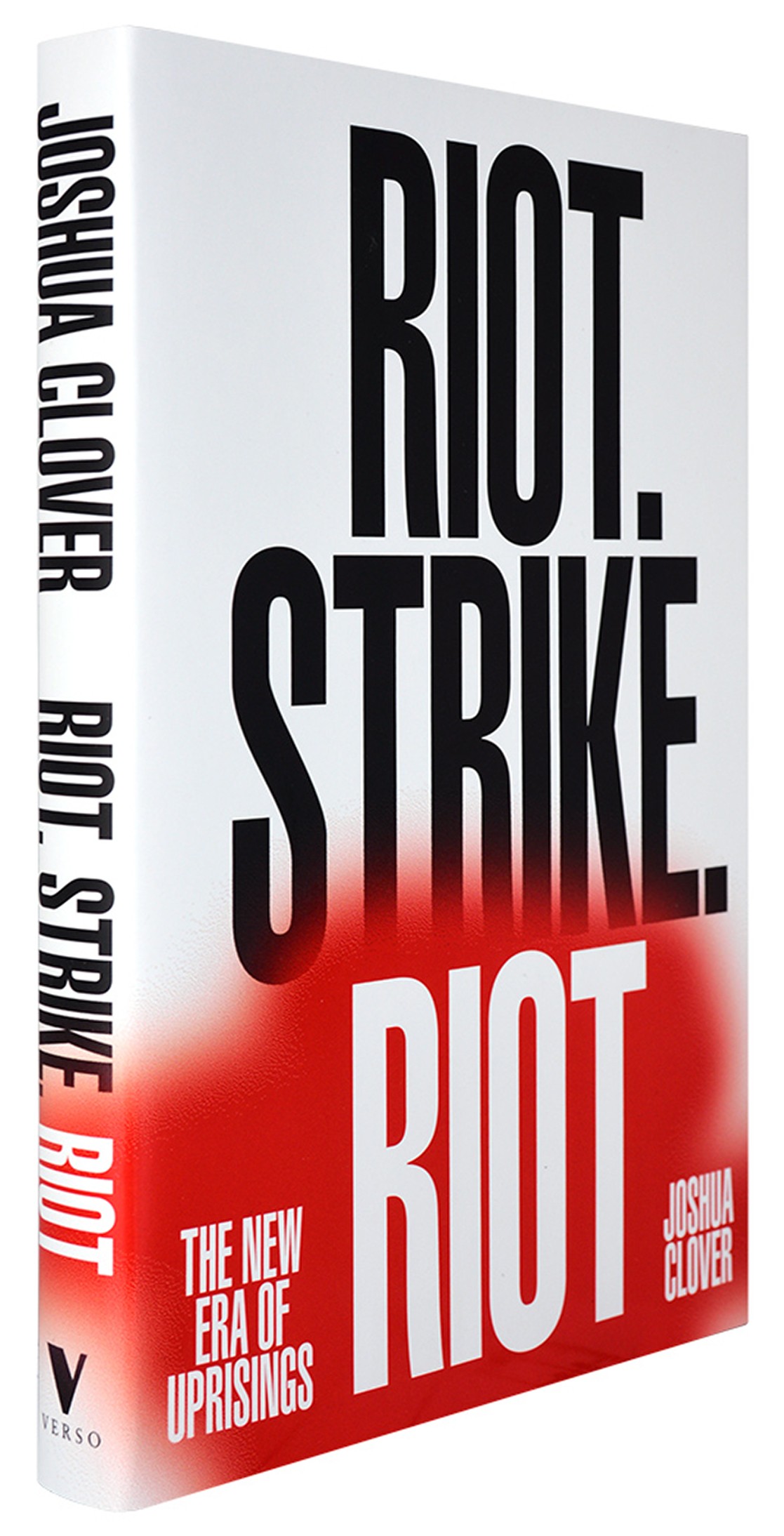One Sunday afternoon last month, Joshua Clover sat at the head of a conference table in Oakland’s Metropolitan Chamber of Commerce and weighed the pleasure of breaking windows against that of looting: “Less payoff — but still delightful.”
Clover, a professor at UC Davis and widely published author, was one of three participants in the Oakland Book Festival panel “Democracy is in the Streets.” He was a bit embattled. Co-panelists Jodi Dean and James Miller objected to the historical accounting and ideological underpinning of his new book, Riot. Strike. Riot: The New Era of Uprisings, recently released on Verso Books. And, in a stealth attack, they both referred to the publication as a “poetics of riots.”
Clover, 53, is a published poet. And he’s one of three poet-proprietors, alongside Juliana Spahr and Jasper Bernes, of AK Press’ radical poetry imprint Commune Editions. But readers expecting a “poetics of riots” from Riot. Strike. Riot will be disappointed. Clover’s book is a scholarly but stylish work of political-economic theory with ample footnotes and phrases such as “dialectical twining.”
Which isn’t to say that its circuitous argument sputters or bores. Rather, it thrills. It elucidates and, in a way, valorizes a taboo fixture of the political arena in an era of seemingly perpetual economic crisis and withering patience for mere reform. The thrust of the book is easy to grasp: In a globalized economy stalked by police equipped like occupying armies, riots have supplanted strikes as the best-suited and most meaningful form of rebellion.
“People talk about riots as being illegible or disordered and I think they’re literally the most legible things in the world,” Clover emphasized in a recent interview, a tuft of white hair bobbing atop his spectacles. “They have two things to say: ‘Fuck the police’ and ‘We can not afford to live in the world that we see before us.'”
The riot, a hallmark of American protest culture since the Sixties, has grown increasingly pronounced lately in cities such as Ferguson, Baltimore, and Oakland. It is popularly and formally defined as a “violent disturbance.” Mainstream media outlets tend to report riots as bad and worse — depending on property damage — and to determine their newsworthiness not by precipitating factors, the neglected why of riots, but by the volume of shrieking condemnation from politicians and business owners. Small business owners — who stake a legitimate claim to being among the 99 Percent — are widely regarded as victims of the mob.
Clover’s book might politically legitimize riots for readers who consider them aberrant, but it’s much more of an explanation than a rallying cry. In conversation, though, he gave short shrift to those who denounce riots as inconvenient. “My snarky pocket summary of the politics of liberalism is that it always comes down to, ‘Don’t hit me,'” Clover said. “‘I’m unhappy but my life is pretty good — don’t hit me,’ whatever that means.”
Clover also has little tolerance for the popular view among progressives, especially self-styled social movement strategists, that rioters are unthinking and animalistic but deserving sympathy. This, he pointed out, is often racially coded. In the term “race riot,” for instance, there’s a presumption of political incoherence compared to the connotations of “protest” or “demonstration.” “That paternalistic response doesn’t allow a riot to have intelligence, doesn’t allow it to have a goal, doesn’t allow it to have a political function, [and] doesn’t allow it to be part of a historical movement,” Clover said. “I think it’s both mistaken and probably racist.”
Clover’s book situates riots within a historical trajectory that reaches as far back as 14th-century Europe, to instances when the dispossessed forcefully interfered with the export of food. This, in Clover’s wording, is a struggle to “set the price of market goods.” The strike, by contrast, took root in workplaces during industrialization as a struggle to “set the price of labor power.” In this cursory recap, riots reemerged in the late 20th century as economic advancement atrophied for broadening parts of the population, necessitating fortified police and prisons to manage the disenfranchised.
Clover sees reflections across continents and centuries: “a slant rhyme between the paradigmatic export riot at King’s Lynn in 1347 and the massive blockade at the Port of Oakland in 2011.” He also sees crucial differences in the contemporary United States, especially the expansion of the prison-industrial complex, which disproportionately locks people of color out of the contemporary economy. In the historical transition that brings the book to the present, Clover argues that the purpose of riots is changing from market interference, or “price-setting,” to rebelling against a pervasive, militarized state.
Prodded about the incongruity of talking insurrection in the chamber of commerce, Clover laughed and said, “That’s — I don’t know what the right term is — embarrassing? Ironic?” But the location for the panel resonated with the Oakland native, because it was just across the street from “Oscar Grant Plaza,” where activists launched Occupy Oakland nearly five years ago.
Sustained expressions of unrest in the East Bay since the killing of Oscar Grant in 2009 nicely illustrate key points in the book. Occupy Oakland, which transformed into riots more often than any other Occupy site that winter, was an attempt at a “class compact,” Clover explained, “between the downwardly mobile middle-class that’s identified with the university but no longer has the future the university promises … and a class that’s been excluded from the economy almost entirely.”
In other words, the broadening base of rioters represents a growing segment of the population for whom the economy promises less and less. They’re unified by dispossession. It’s a development that’s often framed as widening income inequality, remediable in the view of author Robert Reich and Vermont Senator Bernie Sanders through popularly demanded re-regulation of runaway industry (see “Robert Reich’s Multimedia Bid to Save Capitalism,” 5/11/2016). However, Clover sees wealth concentration as but one consequence of “declining value production,” which spells the imminent collapse of capitalism.
For Clover, in other words, broken windows reveal a revolutionary horizon. As he said, “I do see in the increasing implausibility of staying attached to the world we have — which simply can’t provide people what they need — the possibility for people starting to struggle for something substantially different in a way that I’d think about calling a revolution.”
Perhaps relishing the combative atmosphere, he put it a little more snappily at the panel: “The book ends on an optimistic note, which is to say, it’s getting much worse.”

















